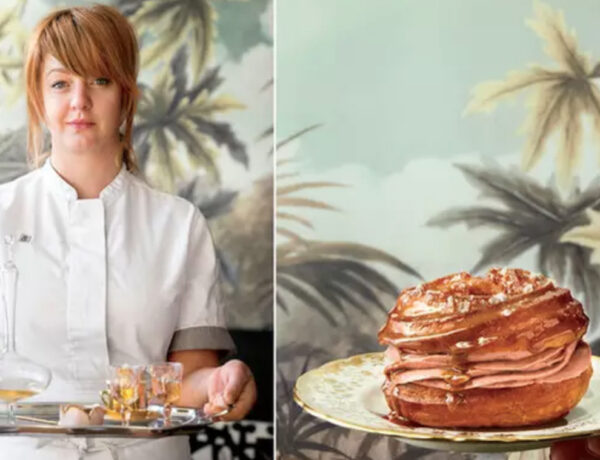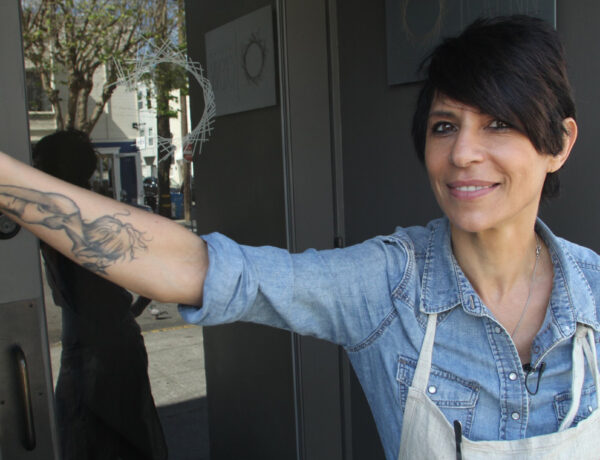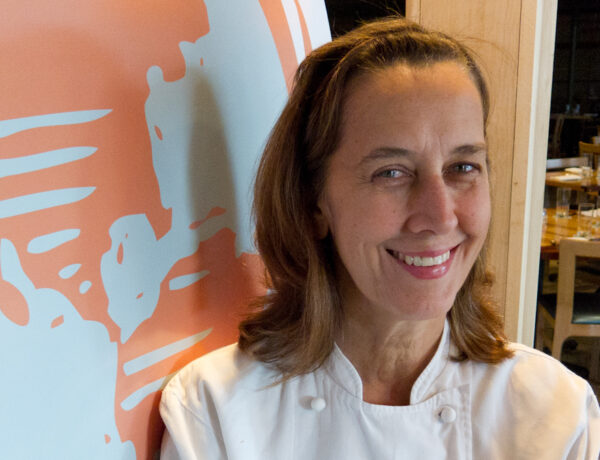
Using her classical training and Caribbean roots, chef-owner Nina Compton rose through BRAVO TV’s “Top Chef” season 11 in New Orleans as the runner-up and fan favorite. She has gone on to open her decorated restaurants, Compère Lapin and Bywater American Bistro. Winning a prestigious James Beard Award in 2018, Chef Compton is the first Black woman to win Best Chef: South.
Today as so many chefs and restauranteurs struggle to battle the effects of COVID-19, push against racism, and simply avoid rust from developing by not cooking daily, Chef Compton discusses how she and her husband and business partner, Larry Miller, work to stay afloat and continue to serve the community.
Your background is St. Lucian. Can you please tell us about your heritage and your upbringing? How did it influence your career path as a chef and the food you wanted to cook?
I was the middle of five children in a close family on a beautiful Caribbean island so you could say it was ideal. My father owned a farm in the southern part of the island and we had numerous fruit trees in our yard at home. Farm to table wasn’t a trend, it was how we thought everyone ate. I had originally wanted to go into agriculture, but after realizing how my family came together over meals and cooking with my mum and granny, I decided that I wanted to cook. I went to The Culinary Institute of America to study and then made it a point to work with the best chefs I could to learn more.
Combining all of the technique and philosophies of different cuisines, I was able to meld those to my childhood memories of food and create something I’m proud of.
Compère Lapin is the name of a mischievous rabbit in Caribbean and Creole folktales. How have the stories influenced the concept and menu of your restaurant?
I think the way we present the meal to the guests is where the playfulness comes in. I’m serving food and drinks of complexity in a very casual environment. We could have served the same dishes on bone china with service staff in tuxedos, but that would have felt too stuffy and not fun at all. If you haven’t dined with us before, you’ll see a server in jeans serving a table with no tablecloth, bread service is a wonderful buttermilk biscuit with two different compound butters, and you feel comfortable. Then, hopefully, as you eat you realize how much thought is put into the preparation of your meal.
You have had such a formidable career path. Can you share which one of your accolades carry a significant sense of achievement and why?
They all mean a great deal, and it’s nice to be recognized. The opportunities to work for and learn from these chefs are special: Working with Daniel Boulud and Alex Lee right out of school was a wonderful push in my desire to exceed; Norman Van Aken showed me how to take the humble ingredients I’d grown up with and elevate their preparation and presentation; Scott Conant taught me the beauty of Italian cuisine, making pastas, and the simplicity of perfect ingredients.
Rising up the ranks in the foodservice industry can be unforgiving and uninviting for women. What was your experience as you pushed through your career? What inspired you to persevere?
It was definitely not for the faint of heart when I was starting out. There wasn’t the awareness we have today about a work/life balance, let alone the etiquette experienced in the normal world. Fortunately for me, I was in very professional kitchens surrounded by high achievers and, for the most part, put my head down and worked as hard as anyone.
The shift in kitchen culture nowadays is a welcome change for those coming up, but it will always be a high intensity environment.
How have you had to pivot to respond to COVID-19 for your businesses?
Originally, we had to shut down completely and lay off the staff of both restaurants which was heartbreaking. You go from spending so much time together and being responsible for their financial well-being, and all of a sudden, you’re hopeless to help. My husband and I did a few drive-thru pop-ups to help pay the bills until we were able to reopen for to-go and limited seating in the restaurants. In June at Bywater American Bistro, we were able to bring a few folks back to work. To keep from getting rusty and to work through new safety protocols, we decided to serve only one table per night. It’s no way to succeed financially, but it was nice to cook for guests again.
We’ve featured Lindsey Ofcacek of The LEE Initiative earlier this year. You were aligned to be a part of The LEE Initiative mentor program for the five ladies chosen for 2020, but the COVID-19 pandemic has temporarily shelved this project. What were you looking forward to teaching these women in your kitchen?
Beyond just working with them on technique and giving them an opportunity to experience a new kitchen, I think there is also the opportunity to role model for them and see what is possible in their future. Chef Edward and Lindsey have created such a positive program for these young chefs, I’m a little jealous. Hopefully, they’ll just freeze this year’s five women and let us partner again with them when we get through this.
Is it a bit of a surprise to you seeing that the Independent Restaurant Coalition is now having frequent conversations with Congress?
I think it was a surprise to all of us! The IRC has been wonderful to be a part of. This thing grew like a bean stalk, and it was amazing to be a part of it. We’ve grown rapidly with great minds working through a situation that none of us imagined. In that sense, it has brought the restaurant community closer together, and as we’ve rolled along, we’ve come to realize how important a role we have as independent operators. We hadn’t previously emphasized our voice enough in policy decisions, and now we jumped straight into the deep end!
I also think that a majority of the politicians hadn’t realized how important we are to our communities, with most of the money we bring in being put right back into our farmers, fishermen, wine salesmen, linen companies, exterminators, and on and on.
Have you encountered any challenges in the industry because you are a woman of color? If so, can you speak to some of those experiences and how you addressed them?
I entered the industry with the outlook of not seeing color or gender. I always pushed forward, not really paying attention, but that is not always the case. I have been many times the only Black person and the only female working in non-inclusive environments; with many hoping that I’d be uncomfortable and eventually breakdown and leave. What I did take from those experiences is not to practice this in my restaurants.
With the rise of voices calling out for progressive social change, like the #MeToo Movement and Black Lives Matter, organizations have been criticized for paying lip service to the media and not working for real change. How can the restaurant industry respond to and thoughtfully manage the expectations of their clientele?
It’s a shame it’s taken this long to come to this point, but here we are. As far as lip service, only time will tell. I think that there is a greater awareness of problems with gender and racial inequity, but more folks are watching for sure. It’s going to take more than a black square on your Instagram to correct wrongs. I just pray that the spirit of those who are recognizing the problems follows through with finding solutions. If the clientele is interested in solutions, they’ll recognize the positive steps being taken.
Is there an influential person whom you particularly admire for creating positive change for women working in the food business?
That’s easy, Leah Chase. She inspires me in every way possible. She was a woman of color in the kitchen in the 1950s! She was consistently in her kitchen until the very end of her 96 years on earth. She fed presidents and Freedom Riders but showed so much humility and compassion for the community. The conversations we shared are so dear to me, and I’m glad I was her friend.
What advice would you have for women who want to get into the food business?
Buckle up and never stop learning. It’s demanding, and your professional goals won’t be realized in a couple of years. Get hired at the best restaurants you can, commit to learning all you can from that kitchen and then ask your chef where you should go work next. Always work clean and be on time.





No Comments